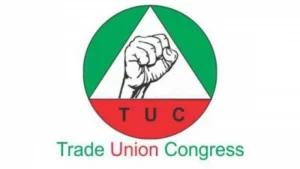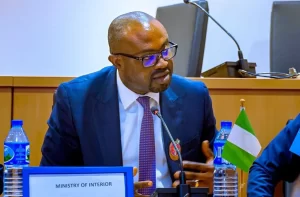Next month, the Nigerian government will be sued in London over actions taken by the Nigeria Customs Service (NCS) to award the concession agreement to a company formed late last year in defiance of the federal government’s approval for the engagement of a consortium led by Bionica West Africa Limited. Huawei Technologies is one of the Special Purpose Vehicle (SPV) partners in Nigeria’s disputed $304 million e-Customs project.
Since the acquisition was approved, the management of NCS has been in litigation with the primary sponsor over its demands for a different shareholding structure and control over the SPV.
On September 17, 2019, the federal government granted approval for the project, which had been started by Bionica West Africa Ltd in 2018 with partners Bergman Security Consultant and Supply Limited (representing the NCS), Huawei, and African Financial Cooperation (AFC). This was in response to a memo that the Minister of Finance, Budget, and National Planning had written to the Federal Executive Council (FEC).
President Muhammadu Buhari granted anticipatory approval for the engagement of the Consortium Bionica Technologies West Africa Limited (Lead sponsor), Bergman Security Consultant and Supplies Limited (Co-sponsor), Africa Finance Corporation (Lead financier), and Huawei (Lead technical service provider) on September 17, 2019, acting on the memo by the Minister of Finance, Budget, and National Planning to FEC for approval
But, the primary sponsor and NCS management have been at odds.
It was discovered that NCS allegedly fabricated paperwork in order to remove Bionica, the project’s primary sponsor, and give them to a business that was purportedly founded late last year by a supporter of the Customs Comptroller General, Col. Hammed Ali (rtd.).
The Comptroller-General of Customs claimed in a letter dated May 23, 2022, which was received by the president’s office on May 24, 2022, that Bionica Technologies West Africa Limited, one of the co-sponsors, had rejected the approved concession agreement by the AGF as instructed by FEC after it had undergone final review and approval by the Attorney General of the Federation (AGF) for execution by parties.
He continued by saying that Bionica rejected and declined to sign the concession deal, which had been thoroughly examined by all parties and approved by the AGF.
The technical partners (Huawei) and the lead financier AFC, according to Ali, confirmed their willingness to carry out their roles in the project’s implementation. Bergman Security Consultant and Supplies Limited and other parties also indicated their readiness to execute the concession agreement, according to Ali.
In light of the aforementioned, Your Excellency is cordially invited to graciously approve that the NCS and ICRC proceed with the implementation of the customs modernization project with Bergman Security Consultant and Supplies Limited as project sponsor, AFC lead financier, and Huawei lead technical service provider under the SPV designated as Trade Modernisation Project Limited with the exclusion of Bionica Technologies West Africa Lim, he wrote in the conclusion of the letter to Buhari.
But, according to records obtained by THISDAY, Bionica started the initiative six years ago, gathered partners, and spent N5.7 billion doing so.
The NCS had previously proposed to partner with the Huawei Consortium, which included Bionica Technologies West Africa Limited (the lead promoter), Bergman Security Consultant and Supplies Limited (the co-promoter), African Finance Corporation (the AFC Lead financier), and Huawei Nigeria Limited as the Technical Partners with other Original Equipment Manufacturers, in a letter to the president dated May 4, 2018, with reference number NCS. ADMMGTO18/S 15/C/Vol VI (OEMs). This was to be done as part of a PPP Concession Agreement in order to create, design, implement, and maintain the necessary e-Customs End-to-End ICT platform to digitalize customs business processes and procedures, upgrade customs ICT infrastructure to a world-class level, address critical operational challenges and loopholes, manage, regulate, control, supervise, and prevent the smuggling of goods across the country’s borders, and also effectively tackle the current national security situation.
Based on this, Bionica applied for and received permission from PenCom, the Infrastructure Concession Regulatory Commission (ICRC), and related government organizations, and then went on to obtain permission from the federal government for the project’s launch.
But, things changed when Customs attempted to remove Bionica as the lead sponsor despite a federal government decision.
The federal government and the Attorney General of the Federation (AGF) were named as respondents in a lawsuit brought by Bionica. The company pleaded with the court to step in and intervene in the case because the e-Customs project, which is supposed to automate and digitalize all NCS business processes and procedures and create a digital, paperless Nigeria Customs organization, is in jeopardy.
THISDAY learned that the NCS quietly moved to get the concession agreement signed with a firm that was established last year despite the lawsuit still being heard in court.
However, in a letter dated October 21, 2022 to the AGF, Bionica’s attorneys asked for the AGF’s assistance with the ongoing problems with the execution of the concession agreement that had been granted by the FEC and were impeding the e-Customs project’s progress.
THISDAY discovered that the project’s overall implementation costs, which included both capital expenditures (CAPEX) and operating expenditures, came to almost $1.896 billion (OpEX).
It was discovered that the e-Customs project will be executed in three phases over the course of the 20-year concession period, with phase one’s investment costing around $304 million in CAPEX, phase two’s costing $465.382 million, and phase three’s costing $435.8 million.
While the Direct Costs for OPEX for the duration of the concession are estimated at $1.896 billion, they include all fixed and variable costs, expenses, and charges directly and completely attributable to the day-to-day operations of the e-Customs platform. The CAPEX covers each deployment phase covering Hardware, Applications, Equipment, Application Implementation Service, ICT infrastructure Service, Marine Deployment, and the SPV costs.
The promoters’ investments and vendor financing were to be used to fund the project. According to the project’s proposed funding strategy, phase 1 would be funded by a $304 million initial investment from the project sponsors, vendor financing, and debt financing.
According to sources familiar with the agreement, the concessionaire and the federal government of Nigeria would employ a phased revenue sharing mechanism and the e-customs project would earn $176.2 billion in total income over the course of the concession.






